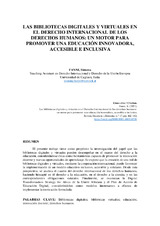Las bibliotecas digitales y virtuales en el Derecho Internacional de los derechos humanos: un motor para promover una educación innovadora, accesible e inclusiva
Digital and virtual libraries in International human rights Law: a powerful tool for the promotion of innovative, accesible and inclusive education

View/
Author
Fanni, Simona
Publisher
UCOPressDate
2021Subject
Bibliotecas digitalesBibliotecas virtuales
Educación
Innovación docente
Derechos humanos
Digital libraries
Virtual libraries
Education
Educational innovation
Human rights
METS:
Mostrar el registro METSPREMIS:
Mostrar el registro PREMISMetadata
Show full item recordAbstract
El presente trabajo tiene como propósito la investigación del papel que las
bibliotecas digitales y virtuales pueden desempeñar en el marco del derecho a la
educación, considerándose éstas como herramientas capaces de promover la innovación
docente y nuevas oportunidades de aprendizaje. Se expone que la creación de una red de
bibliotecas digitales y virtuales, mediante la cooperación internacional, puede favorecer
la implementación de un modelo educativo inclusivo, accesible y solidario. Desde esta
perspectiva, se analiza el cuadro del derecho internacional de los derechos humanos,
haciendo hincapié en el derecho a la educación, en el derecho a la ciencia, y en las
correspondientes obligaciones estatales. Finalmente, se examinan la Digital
Transformation Strategy for Africa de la Unión Africana y el Plan de Acción de
Educación Digital, considerándolos como modelos interesantes a efectos de
implementar la teorización formulada. The present study explores the role that digital and virtual libraries may play in
the framework of the right to education, as they are capable of promoting educational
innovation and the definition of new learning opportunities. In particular, this study
argues that the creation of a network of digital and virtual libraries through international
cooperation may help the implementation of an inclusive and accessible educational
model, based on solidarity. From this perspective, the landscape of international human
rights law is analysed, especially the right to education and the right to enjoy the
benefits of scientific progress, as well as the corresponding States’ obligations. Finally,
two significant regional projects are assessed, namely, African Union’s Digital
Transformation Strategy for Africa and the Digital Education Plan of the European
Union, since they represent two viable models for the implementation of the view that
this study theorizes.
